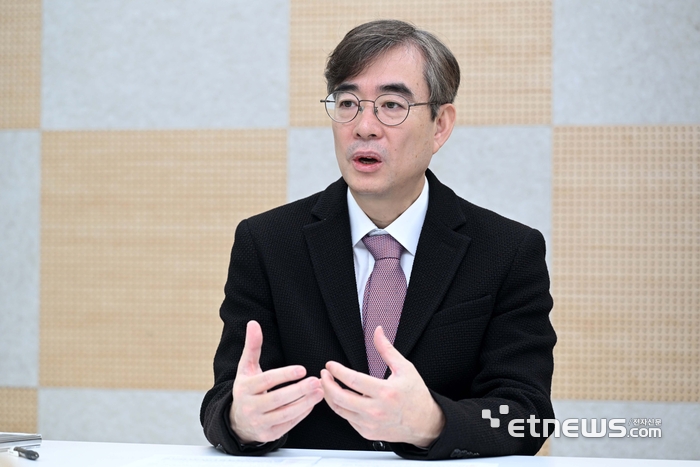

- R&D
- Technology
- Product
- Company
- Customer center
Promotion center
- Promotion center
- Press release
Chairman of KISIA, emerging markets such as Southeast Asia and the Middle East."
- 2025.03.13

Korea's information protection industry is targeting emerging markets such as Southeast Asia and the Middle East. It will also focus on nurturing human resources by establishing a full-time management system for information protection experts and providing professional training for the chief information protection officer.
The Korea Information Protection Industry Association (KISIA) held its 29th regular general meeting at Yangjae L Tower in Seocho-gu, Seoul on the afternoon of the 25th and announced a new vision and major focus projects this year.
KISIA made "Secure-up Together" its core vision this year, following the banner of "Build-up Together" last year. As the importance of establishing an information protection autonomous security system is growing in the rapidly changing cyber threat environment, it plans to make efforts to create a solid security ecosystem where the industry can grow and cooperate together.
First of all, an autonomous security consultative body will be established to promote cooperation among information protection companies and strengthen their own security. Small information protection companies will also share practical security enhancement rules to induce autonomous participation in security. The consultative body will be joined by 10 organizations including AhnLab, Monitor Lab, SecureLink and P&P Secure, as well as the chairmen of KISIA. Also, advisors will be Lee Man-hee, a professor at Hannam University, Lee Won-tae, a professor at Ajou University, Kim Chang-ho, a Yanolja CISO, Oh Jin-young, head of the information protection industry division at the Korea Internet & Security Agency, and Choi Kwang-hee, an advisor to the law firm.
Kim Jin-soo, CEO of Trinity Soft, who leads the council, said, "We will autonomously carry out various activities to increase security capabilities," adding, "We will strengthen security by sharing case studies of exemplary companies."
KISIA plans to establish a place for communication to strengthen interoperability, centering on the affiliated Korea Zero Trust Committee (KOZETA). As Zero Trust is limited to products from a single vendor, collaboration between various companies is essential. It will also carry out promotional activities to promote KOZETA suppliers' Zero Trust security solutions.
KOZETA Chairman Bae Hwan-guk (CEO of SoftCamp) said, "For cooperation between information protection companies, it is first to know what the other party is good at," adding, "We will create a place where companies can see how to strengthen security with the concept of zero trust."
In particular, cooperation between information protection companies will be strengthened to target the global market. Specifically, it promotes sharing of export information between companies through overseas expansion consultative bodies, development of export models through networking and collaboration, and collection of opinions on government recommendations.
The targets are emerging markets such as Southeast Asia and the Middle East. The KISIA explained that these countries tend to prefer Korea's information protection products over the form of major hegemony countries such as the U.S., Israel, and China due to geopolitical influence such as the Russia-Ukraine war, Israel-Palestine war, and the South China Sea conflict.
"The demand for Korean information protection products is increasing due to the recent geopolitical crisis," KISIA said. "We will actively support domestic companies to enter the global market stably based on customized support projects for the entire export process."
It also plans to step up efforts to cultivate human resources for information protection. First of all, it will closely link industrial sites with government policies through the Information Protection Human Resource Development Committee (ISC), and play a leading role in nurturing human resources and resolving difficulties in the field of work. It will run education programs such as "S-Developer" and "Security Academy" to discover and nurture human resources who can protect information to meet industrial demands, while also actively nurturing professional human resources in the field of artificial intelligence (AI) security and convergence security.
In particular, the government will establish a management system for information protection professionals in the previous period. Based on this, the government will design a roadmap for each stage of career from information protection staff to CISO to support the development of capabilities of professional manpower throughout the previous period. In addition, the government will collaborate with related organizations such as the Central Radio Management Office, which manages the CISO, to promote education to strengthen information protection capabilities for CISO in each region. This is because there is no specialized training for CISO by level, and the educational foundation outside the metropolitan area is poor.
The KISIA also held a cyber sovereignty protection award ceremony jointly established with the Korean Society for Information Protection. Shin Yong-seok, cyber security secretary at the National Security Office, Park Chun-sik, professor at Ajou University, and Hong Jin-bae, president of the Information and Communication Planning and Evaluation Institute, were selected as this year's winners. Kim Jin-soo was appointed as the vacant senior vice chairman.
"We want to go from the 'build-up' stage where the public, government, and academia cooperate closely and build each other's capabilities to the 'security-up' stage," said Cho Young-chul, chairman of KISIA. "We will provide full support so that the entire domestic security industry can grow together."
Reporter Cho Jae-hak 2jh@etnews.com
 TOP
TOP





